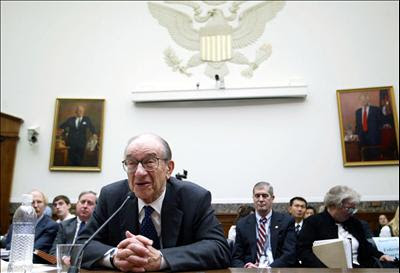
“I made a mistake in presuming that the self-interest of organisations, specifically banks and others, was such that they were best capable of protecting their own shareholders,”--Alan Greenspan
This comment by Alan Greenspan, the former chairman of the Federal Reserve in relation to the cause of the economic crisis is perhaps surprising and completely unexpected. In it Alan Greenspan admits that his belief that companies would not be willing to make decisions that would significantly increase their risk profile and place the future of their business in question was "wrong".
These views held by Greenspan were influenced by a close friend of his called Ayn Rand. Rand was Russian born but emigrated to the US in 1925. In America she became a writer and later developed philosophical ideology that became known as objectivism. Her fundamental principle is that self interest is the true standard of morality and that altruism is profoundly immoral. While, in relation to capitalism she declared
"When I say 'capitalism', I mean a full, pure, uncontrolled, unregulated laissez-faire capitalism."
These ideas greatly influenced Greenspan, as he dedicated much of his career to ensuring that government intervention in the market was optimally minimal. As an example, in 1997 the then commsioner of the Commodity Futures Trading Commission Brooksley Born told the congress committee that the existing financial deriviates "threaten our regulated markets or, indeed, our economy”.
Her views on the financial derivatives market were treated with disdain by Greenspan. According to the NYT Greenspan was of the "view that that too many rules would damage Wall Street, prompting traders to take their business overseas". Robert Rubin, Clinton's Treasury Seretary shared Greenspans view.
Greenspan's opinion was accepted. As a consequence, nothing was done to curb the excesses of this these financial enigmas. Brooksley Born left her postion in 1999 and the commodity futures trading commission lost its regulatory authority over derivatives as recommended by Greenspan.
Greenspan began studying economics at New York University after studying the clarinet at Juillards. A fellow student of Greenspan said of the environment at the university during a BBC profile of the him that "What really bound us together was the sense that economics was undergoing a transition and we were there at the frontier. Anyone who was studying economics at that time was determined that there would never be another major depression. The depression of the 1930s had led to World War Two, and so there we were imbued with the sense that we couldn’t let this disaster occur again."
Greenspan felt thoughout his career that truth was on his side, that the ideas and policies that he was implementing would ensure that there would not be another great depression. The passing of time may prove otherwise, but can we ask any more of officials whether in the private or public sector but to carry out his/her work with an idealogy that they feel will place humanity on a better path.
1 comment:
Obviously he should have stuck to music
Post a Comment